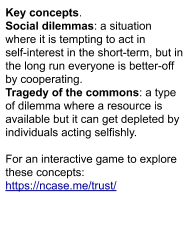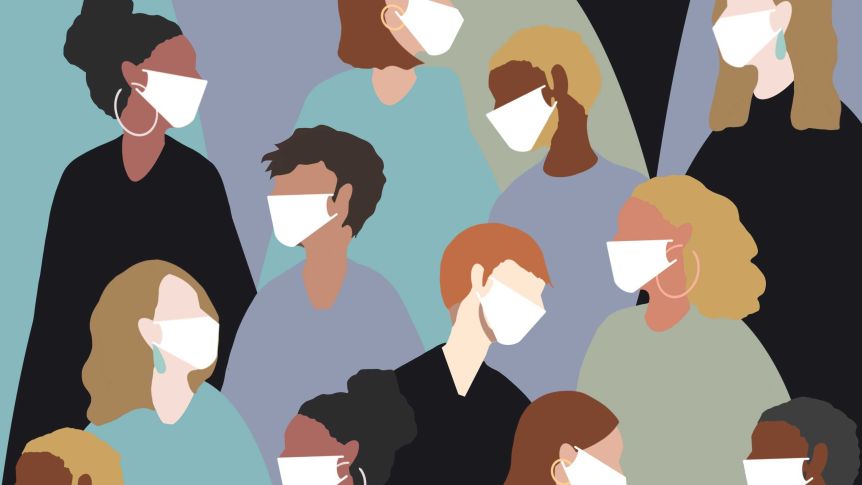Article by PhD Researcher Eladio Montero. Revised by Tom Lenaerts, Jelena Grujic.
A recent investigation by the University of Ghent in Belgium revealed that today, only 33% of Flemish people are willing to comply with the COVID-19 health measures, compared with 81% in March. This lack of motivation is a big issue, suppose that everyone around you decides to not follow any measure, and by doing so, it will put everyone at risk, increasing the infected and death numbers. This situation is called “tragedy of the commons” in social dilemmas, when acting in self-interest affects the common good, in this case, public health. Theoretical and experimental work on cooperation in social dilemmas, provide insights into how cooperation can be sustained. Understanding these principles may help policy-makers in making impactful choices.

According to some of the participants, reasons for this decrease in motivation go from lack of straightforwardness from the authorities to the feeling that the fear is gone. Maarten Vansteenkiste, professor of Motivational Psychology at UGent argues that people might decrease their motivation to cooperate with time, because it is costly: i.e. is energy consuming, and it’s seen as more of an obligation rather than an act of solidarity with society. The decrease of cooperation observed by Prof. Vansteenkiste is thus self-selecting for even less compliance.
Adding to the challenges of this pandemic, due to the lack of a vaccine and effective cures, the responsibility to contain the virus relies on how we coordinate our actions throughout an uncertain amount of time. This means that neither governments nor citizens know how bad the catastrophe is going to be, and for how long is going to last until an effective cure is found. It has been shown experimentally that in crises such as climate change, participants failed to reach the goal when they were not informed about how long the experiment was going to last or how much effort was required1. Recently, work by AI Lab’s Elias Fernández Domingos, Prof. Jelena Grujić and Prof. Tom Lenaerts showed how timing uncertainty leads to generous contributions at the beginning while reducing collective success at the same time2.
This issue with uncertainty is reflected in this COVID-19 crisis where according to Prof. Vansteenkiste “it is important that the population gets perspective, that the government indicates in concrete terms where we want to go”. Indeed, having clear goals has been proven to increase cooperation in collective actions, or as a testimony by a lady put it: “People are tired of it, it was promised that things would get better now” (Anja, 49).
It is safe to say by now that we all experimented at some point some kind of behavior change: whether it was by peer pressure that we ended up complying with the regulations, or we became frustrated by seeing other people not cooperating. We as individuals must know that our own actions shape others’ actions and vice versa, since we all look for signals that validate or confront our own behavior. Work by AI Lab’s Prof. Jelena Grujić has shown that in general, people’s first instinct is to cooperate (as was confirmed by Prof. Vansteenkiste’s data at the beginning of the COVID-19 crisis). However, their context can shape their expectations and motivations (whether is to positively reinforcing it, or lead to frustration)3.
Going back to our society, it is the network of contacts that not only influences the spread of the disease, but also the spread of cooperation. The work of Prof. Tom Lenaerts has shown that both, the shape of the network4 and the contact dynamics determine cooperation5. Therefore, it is possible to model the spread of the disease in conjunction with the spread of cooperation as this immediately reveals whether regulations have a chance to lead to the anticipated outcome.
The inclusion of technology (in this case the Coronalert, the contact-tracing app created for Belgium) might also affect our desire and motivations to cooperate6,7, and at the same time, we as humans shape the behavior of these systems, both by providing the data but also by designing these algorithms and handling these data. Cooperating by installing an app on our smartphone and sharing our personal information such as location also follows the uncertainty principle described earlier. A survey by the Kenniscentrum Data & Maatschappij8 reveals that 78% of the respondents believe that the data collected by Coronalert will end up in the hands of other organizations or companies, posing a risk for our privacy. Despite this risk, 51% of those surveyed are willing to install the app, however this cooperation rate drops to 34% after the corona crisis (which interestingly is the same cooperation rate as the survey by Prof. Vansteenkiste revealed).
Ultimately, all this lack of trust affects people’s motivation: both in the authorities and in other citizens. Trust is essential to achieve cooperation in this and all other social dilemmas9, future measures and the future of the pandemic will depend on how much we trust the regulators and each other. Will trust be promoted when the app finally rolls out and informs you about the infected persons in your environment? This is maybe one question that Prof. Vansteenkiste can ask in his next survey.
6. Rahwan, I. et al. Machine behaviour. Nature 568, 477–486 (2019).
7. Crandall, J. W. et al. Cooperating with machines. Nature Communications 9, 233 (2018).
9. Trust in Social Dilemmas. (Oxford University Press, 2017).

